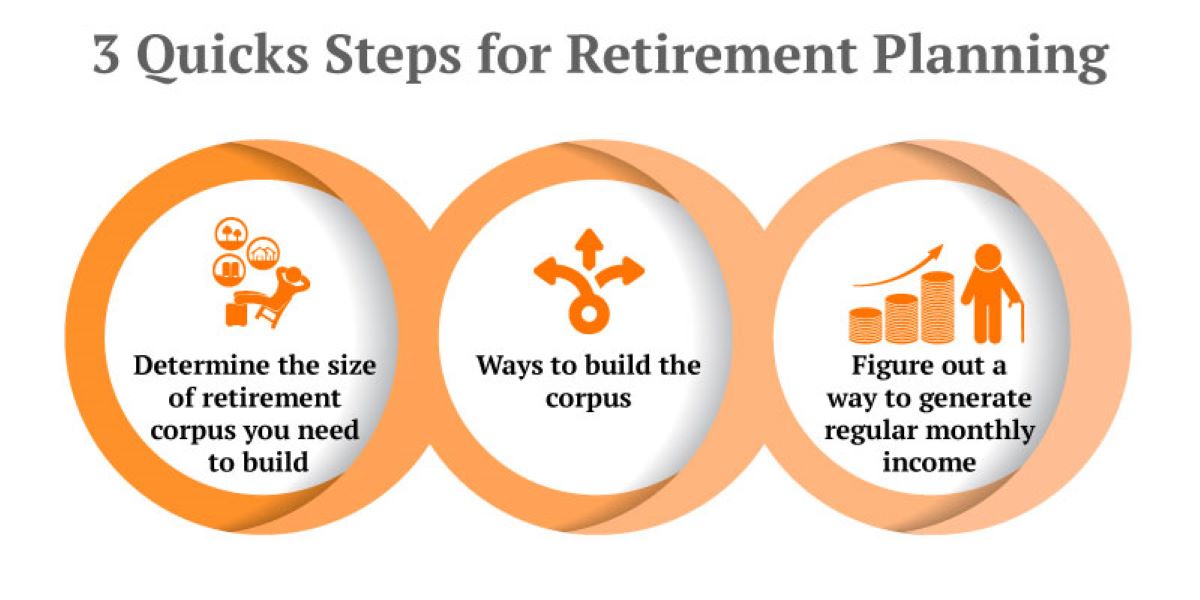

Finance
How To Include A House In Retirement Planning
Modified: February 21, 2024
Learn how to incorporate your house into your retirement plan and ensure financial security. Get expert advice on retirement planning with a focus on finance.
(Many of the links in this article redirect to a specific reviewed product. Your purchase of these products through affiliate links helps to generate commission for LiveWell, at no extra cost. Learn more)
Table of Contents
- Introduction
- Importance of Including a House in Retirement Planning
- Factors to Consider when Including a House in Retirement Planning
- Evaluating the Current Value of Your House
- Analyzing the Impact of Home Equity on Retirement Savings
- Determining the Best Use of Home Equity in Retirement
- Assessing the Costs and Benefits of Downsizing or Relocating
- Strategies for Incorporating Home Equity into Retirement Income
- Tax Implications of Including a House in Retirement Planning
- Potential Risks and Mitigation Strategies
- Conclusion
Introduction
Retirement planning is a crucial step in ensuring financial security in our golden years. As we approach retirement, it’s essential to consider all assets – including our homes – in the planning process. The decision to include a house in retirement planning can have a significant impact on our overall financial well-being.
Most people have a substantial portion of their net worth tied up in their homes. Therefore, it’s essential to evaluate the role that this asset plays in our retirement strategy, as its value can provide a valuable source of income or potential flexibility for other financial goals.
In this article, we’ll explore the importance of including a house in retirement planning and discuss various factors to consider when making this decision. We’ll also delve into evaluating the current value of your house, analyzing the impact of home equity on retirement savings, and determining the best use of home equity in retirement. Furthermore, we’ll discuss the costs and benefits of downsizing or relocating, strategies for incorporating home equity into retirement income, tax implications, and potential risks and mitigation strategies.
By the end of this article, you’ll gain a comprehensive understanding of how to leverage your home to maximize your retirement savings and overall financial security.
Importance of Including a House in Retirement Planning
When it comes to retirement planning, many individuals focus primarily on their savings and investment accounts. However, overlooking the potential value and benefits of including a house can be a missed opportunity. Incorporating your house into your retirement plan is crucial for several reasons:
- Asset Appreciation: Over time, the value of real estate tends to appreciate. By including your house in your retirement plan, you can tap into this appreciation as a potential source of income. Selling your home later in life could provide a substantial financial boost for your retirement.
- Home Equity: Owning a home can build equity, which is the difference between the property’s market value and the outstanding mortgage balance. Including your house in your retirement plan allows you to utilize this equity to fund your retirement expenses or other financial goals.
- Alternative Income Stream: Renting out a portion of your home or considering a reverse mortgage can provide additional income during retirement. This income can supplement your savings and investments, helping to ensure a more comfortable retirement lifestyle.
- Flexibility: Your house can offer flexibility in retirement. It can serve as a safety net, providing a place to live without the burden of monthly rent. It also allows you to have control over your living arrangements, whether that’s staying in your current home, downsizing, or relocating to a more cost-effective area.
- Emotional Attachment: Your home holds sentimental value and memories. Including it in your retirement plan allows you to maintain a sense of familiarity and stability, which can positively impact your overall well-being during this new chapter of life.
Including a house in your retirement planning is not only about the financial benefits; it’s also about considering the emotional and personal factors that come into play. By taking a holistic approach to retirement planning and considering your home as a valuable asset, you can create a more comprehensive and secure retirement strategy.
Factors to Consider when Including a House in Retirement Planning
When including a house in your retirement planning, several factors need to be carefully considered. These factors will shape your decision-making process and help you determine the best approach for utilizing your home as an asset in retirement. Here are some crucial factors to keep in mind:
- Market Conditions: The current real estate market conditions can significantly impact the value of your house and the potential for appreciation. It’s essential to stay informed about local market trends and consult with real estate professionals to get an accurate assessment of your home’s value.
- Mortgage and Debt: Take into account the outstanding mortgage balance and any other debts secured by your home. Consider the impact of your mortgage payments on your retirement budget and evaluate whether paying off the mortgage before retiring is a viable option.
- Location: The location of your home can play a role in its long-term value and potential rental income. Consider factors such as proximity to amenities, job opportunities, and desirability of the neighborhood when evaluating its potential in retirement planning.
- Market Rental Rates: If you plan to rent out a portion of your home or consider becoming a landlord during retirement, research local rental rates to ensure it aligns with your financial goals. Rental income can be a valuable source of additional cash flow, but it’s essential to assess the demand and rental market in your area.
- Maintenance and Upkeep: Owning a home comes with ongoing maintenance and repair costs. Consider the potential costs associated with maintaining your house in retirement, and whether you have the financial resources or the desire to handle these responsibilities.
- Future Housing Needs: Evaluate your long-term housing needs. Assess whether your current home can accommodate your lifestyle in retirement or if downsizing or relocating to a smaller or more suitable property would be a better option.
- Insurance and Property Taxes: Take into account the costs of homeowner’s insurance and property taxes in your retirement planning. These expenses can vary based on the value of your home and its location.
- Health Considerations: Consider how your health may impact your ability to maintain and manage your home. If health concerns arise, you may need to explore alternative living arrangements or modifications to your current home.
By carefully considering these factors, you can make informed decisions about how to incorporate your house into your retirement plan. Remember to consult with financial advisors, real estate professionals, and other experts to ensure you have a comprehensive understanding of the implications and opportunities associated with including your house in your retirement planning.
Evaluating the Current Value of Your House
When including your house in retirement planning, it’s crucial to have an accurate understanding of its current value. The value of your home will impact the potential income and financial benefits it can provide during retirement. Here are some key steps to evaluate the current value of your house:
- Research Comparable Sales: Look at recent sales of similar homes in your neighborhood or surrounding area. This will give you an idea of what similar properties are selling for and help you estimate your own home’s value.
- Consult a Real Estate Agent: Reach out to a local real estate agent who has expertise in your area. They can provide a professional assessment of your home’s value based on market trends, property condition, and location. Their knowledge can be invaluable in determining a fair and accurate value for your house.
- Use Online Valuation Tools: Several online platforms offer home valuation estimates based on public records and market data. While these tools can provide a general idea of your home’s worth, keep in mind that they are not as accurate as an appraisal or expert evaluation.
- Consider Recent Home Improvements: If you have made substantial upgrades or renovations to your home, take them into account when evaluating its value. These improvements can increase the market value and make your house more attractive to potential buyers or renters.
- Track Local Market Conditions: Stay informed about the current real estate market in your area. Factors such as supply and demand, economic conditions, and demographic trends can affect property values. Monitoring these conditions can help you gauge the potential for appreciation over time.
- Get a Professional Appraisal: For a more accurate valuation, consider hiring a professional appraiser. An appraiser will conduct a thorough assessment of your home’s condition and market value, taking into account various factors such as location, size, features, and recent sales of comparable properties.
- Keep Documentation: Keep records of any relevant documents, such as property tax assessments, home improvement receipts, and mortgage statements. These documents can provide valuable information when evaluating your home’s value and help support your assessment.
By following these steps and gathering information from various sources, you can get a comprehensive picture of your home’s current value. Remember, the market value of your house may fluctuate over time, so it’s important to reassess its value periodically and adjust your retirement plan accordingly.
Analyzing the Impact of Home Equity on Retirement Savings
Home equity plays a significant role in retirement planning, as it can have a substantial impact on your overall savings and financial security. Understanding the potential impact of home equity on your retirement is crucial. Here are some key considerations when analyzing the impact of home equity on your retirement savings:
- Additional Source of Income: Home equity can function as an additional source of income during retirement. You can tap into your home equity through various methods, such as selling your home, renting out a portion of it, or considering a reverse mortgage. This extra income can supplement your retirement savings and help fund your living expenses.
- Flexibility in Financial Planning: The presence of home equity can provide flexibility in your financial planning. Depending on your needs and circumstances, you may have the option to downsize your home or relocate to a more cost-effective area. This can free up additional funds that can be allocated towards other retirement goals, such as travel, healthcare expenses, or supporting family members.
- Potential Capital Growth: Over time, your home’s value may appreciate, building more equity. This growth in equity can serve as an asset that can be accessed later in retirement when needed. Keep in mind that the real estate market can fluctuate, and it’s essential to monitor market conditions and trends to maximize the potential benefits of capital growth.
- Reducing Housing Expenses: Utilizing home equity can help reduce or eliminate housing-related expenses, such as mortgage payments, property taxes, and homeowner’s insurance. By paying off your mortgage or downsizing to a smaller, more affordable property, you can free up a significant portion of your retirement income for other purposes.
- Careful Consideration of Risks: While home equity can provide valuable opportunities for financial flexibility in retirement, it’s important to carefully assess the associated risks. Market downturns, unexpected maintenance expenses, and changes in personal circumstances can impact the value and accessibility of your home equity. It’s essential to have contingency plans in place to mitigate these risks.
- Impact on Means-Tested Benefits: If you are receiving means-tested benefits, such as Medicaid or Supplemental Security Income (SSI), it’s crucial to understand how accessing home equity may affect your eligibility. Consult with a financial advisor or a benefits specialist to determine the potential impact on your benefits and develop a strategy that minimizes any negative consequences.
Analyzing the impact of home equity on your retirement savings requires careful consideration of your individual circumstances, housing market conditions, and financial goals. It’s advisable to seek guidance from financial advisors who specialize in retirement planning to ensure that you make informed decisions that align with your overall financial objectives.
Determining the Best Use of Home Equity in Retirement
Deciding on the best use of home equity in retirement is a critical part of your overall financial planning strategy. Carefully considering your options can help you make the most of this valuable asset. Here are some factors to consider when determining the best use of home equity in retirement:
- Financial Needs and Goals: Start by assessing your financial needs and goals for retirement. Consider factors such as your desired lifestyle, healthcare expenses, travel plans, and any other financial obligations. This will help you determine how much of your home equity you may need to access and allocate towards meeting these objectives.
- Exploring All Options: Familiarize yourself with the different ways you can access your home equity, such as selling your home, renting out a portion of it, or considering a reverse mortgage. Each option has its benefits and considerations, so it’s crucial to explore them thoroughly and determine which aligns best with your specific circumstances.
- Downsizing or Relocating: Downsizing to a smaller, more cost-effective property or relocating to an area with a lower cost of living can be an effective way to utilize home equity. This can potentially free up cash that can be used to supplement retirement income, cover expenses, or enhance your financial flexibility.
- Home Equity Loans or Lines of Credit: If you have a specific need for funds, such as home repairs or medical expenses, you may consider leveraging your home equity through a loan or line of credit. These options allow you to access a portion of your home equity while keeping your home as an asset.
- Reverse Mortgage: A reverse mortgage is a financial product that allows homeowners aged 62 or older to tap into their home equity without having to sell their property. It can provide a stream of income, a lump sum, or a line of credit, offering financial flexibility for retirees.
- Seek Professional Guidance: Consulting with a financial advisor who specializes in retirement planning and reverse mortgages can provide valuable insights and help you navigate the complexities of utilizing home equity in retirement. They can evaluate your specific situation and goals to provide personalized recommendations.
Remember that the best use of home equity in retirement will depend on your unique circumstances and goals. It’s essential to evaluate the pros and cons of each option, consider the potential risks and rewards, and consult with professionals to ensure your decisions align with your overall financial objectives.
Assessing the Costs and Benefits of Downsizing or Relocating
Downsizing or relocating during retirement is a significant decision that can have a profound impact on your financial situation and overall quality of life. It’s essential to carefully assess the costs and benefits associated with this choice. Here are some factors to consider:
- Housing Expenses: Downsizing or relocating often results in lower housing expenses. A smaller home or a new location with a lower cost of living can reduce mortgage payments, property taxes, insurance costs, and maintenance expenses. Assessing these potential savings is crucial in determining the financial benefits of downsizing or relocating.
- Market Conditions: Evaluate the current real estate market conditions in both your current area and the potential location you’re considering. Analyze housing prices, demand, and trends to determine the potential value of your current home and what you can afford in a new location.
- Quality of Life: Consider how downsizing or relocating can improve your quality of life. For example, moving to a more walkable neighborhood, closer to family and friends, or to a community with amenities and services tailored to retirees can enhance your overall well-being and social connections.
- Community and Support: Evaluate the availability and accessibility of healthcare services, recreational activities, and social support systems in the potential new location. Consider how these factors may contribute to your overall happiness and sense of belonging in retirement.
- Emotional Attachment: Reflect on your emotional attachment to your current home and community. Downsizing or relocating may entail leaving behind familiar surroundings and relationships, which can be challenging for some individuals. Consider how important these emotional connections are to your overall happiness in retirement.
- Proximity to Family and Support Network: Assess the proximity to family members, friends, and other support networks in both your current location and the potential new area. Being close to loved ones or having a strong support system can greatly impact your social and emotional well-being in retirement.
- Moving Costs: Take into account the costs associated with downsizing or relocating, including moving expenses, real estate agent fees, closing costs, and potential renovation or home staging costs. Factoring in these expenses will help determine the financial feasibility and benefits of the move.
- Future Needs and Amenities: Consider your future needs and lifestyle preferences in retirement. Assess if the potential new location can accommodate these needs better than your current home. For example, access to healthcare facilities, recreational opportunities, transportation options, and other amenities may play a role in your decision.
Assessing the costs and benefits of downsizing or relocating requires a thoughtful evaluation of financial, emotional, and practical considerations. It’s important to weigh these factors based on your personal circumstances and goals for retirement. Consulting with a financial advisor and real estate professional can provide valuable insights and guidance to help you make an informed decision that aligns with your retirement vision.
Strategies for Incorporating Home Equity into Retirement Income
Incorporating home equity into your retirement income can provide you with additional financial resources and enhance your overall retirement strategy. Here are some effective strategies to consider:
- Sell and Downsize: One common strategy is to sell your current home and purchase a smaller, more affordable property. By downsizing, you can unlock the equity in your home and potentially eliminate mortgage payments or reduce your monthly housing expenses. The remaining proceeds can be invested to generate additional retirement income.
- Rent Out a Portion of Your Home: If you have extra space in your home, consider renting out a portion of it. Becoming a landlord can provide you with a steady stream of rental income that can supplement your retirement savings. However, it’s important to carefully consider the responsibilities and legal obligations that come with being a landlord.
- Consider a Reverse Mortgage: A reverse mortgage allows homeowners aged 62 or older to convert a portion of their home equity into tax-free loan proceeds. The loan does not require repayment until the homeowner sells the home, moves out, or passes away. This option provides retirees with a regular income stream or a lump sum payment while allowing them to remain in their home.
- Home Equity Line of Credit (HELOC): A HELOC is a line of credit secured by your home equity. It provides you with the flexibility to borrow funds when needed and repay them with interest over time. This strategy allows you to tap into your home equity as a source of supplemental income while retaining ownership of your home.
- Bridge Financing: If you plan to downsize or relocate but have not yet sold your current home, bridge financing can help bridge the gap between the purchase of your new home and the sale of your existing property. This temporary financing option can provide you with the funds you need to facilitate the transition without depleting your retirement savings.
- Deferred Home Sale: If you prefer to remain in your current home but still need additional income, a deferred home sale may be an option. A deferred home sale allows you to receive a lump sum payment or regular disbursements while retaining the right to remain in the home until you pass away or move out.
Each strategy has its own considerations, benefits, and potential drawbacks. Before committing to any specific approach, it’s crucial to consult with financial professionals who specialize in retirement planning and understand the implications of incorporating home equity into your retirement income. They can help you evaluate which strategy aligns best with your financial goals and risk tolerance.
Tax Implications of Including a House in Retirement Planning
Including a house in your retirement planning has various tax implications that you should consider. Understanding these implications will help you make informed decisions and effectively manage your tax obligations. Here are some key tax considerations:
- Capital Gains Tax: If you sell your home for a profit, you may be subject to capital gains tax. However, there is a potential tax exemption. As of 2021, if you have owned and used the property as your primary residence for at least two out of the past five years, you may qualify for a capital gains tax exclusion of up to $250,000 (or up to $500,000 for married couples filing jointly).
- Rental Income: If you rent out a portion of your home during retirement, the rental income you receive is generally taxable. You must report the rental income on your tax return and may be able to deduct related expenses, such as mortgage interest, property taxes, and maintenance costs.
- Reverse Mortgage: Proceeds from a reverse mortgage are generally tax-free since they are considered loan advances and not income. However, consult with a tax professional to understand any potential implications specific to your situation.
- Home Equity Loans: Interest paid on home equity loans or lines of credit (HELOC) may be tax-deductible, subject to certain limitations. It’s advisable to consult with a tax advisor to determine your eligibility for these deductions.
- Property Taxes: Property taxes are typically deductible on your federal tax return, reducing your taxable income. Keep track of your property tax payments and consult with a tax professional to understand the specific rules and limitations regarding deductions in your jurisdiction.
- State and Local Taxes: Some states or local jurisdictions impose taxes on real estate. These may include property taxes, transfer taxes, or other assessments. Understand the tax laws in your area to factor in these costs when evaluating the financial impact of including your house in your retirement plan.
- State-Specific Benefits: Certain states offer additional tax benefits for retirees, such as property tax exemptions, deductions, or credits. Research the tax laws and incentives specific to your state of residence to determine if any advantageous programs may apply to you.
It’s important to note that tax laws and regulations can change, and everyone’s tax situation is unique. Consider consulting with a qualified tax professional or financial advisor who can provide personalized guidance based on your specific circumstances and the most up-to-date tax laws.
Potential Risks and Mitigation Strategies
Including a house in your retirement planning comes with potential risks that you should be aware of. Understanding these risks and implementing mitigation strategies can help protect your financial well-being. Here are some key risks and ways to manage them:
- Real Estate Market Volatility: The real estate market can be subject to fluctuations, and the value of your home may go up or down. To mitigate this risk, it’s important to have a diversified retirement portfolio that includes other assets, such as stocks, bonds, and cash. Diversification can help mitigate the impact of a decline in housing values.
- Unexpected Maintenance and Repair Costs: Owning a home involves ongoing maintenance and the potential for major repairs. To mitigate this risk, set aside funds for regular maintenance and establish an emergency fund specifically designated for unexpected repairs. Regular home inspections can also help identify potential issues before they become costly problems.
- Longevity Risk: There is always a risk of outliving your retirement savings. If you plan to rely on home equity as a source of income during retirement, consider the potential impact of increasing life expectancy. Ensure that your financial plan accounts for potential long-term care expenses or adjustments in living arrangements if needed.
- Interest Rate Fluctuations: If you have an existing mortgage or plan to use home equity loans or lines of credit, fluctuations in interest rates can affect your monthly payments. To mitigate this risk, consider fixed-rate mortgage options or explore locking in interest rates for home equity financing if available.
- Tax Law Changes: Tax laws and regulations are subject to change, and these changes can impact the tax implications of including a house in your retirement planning. Stay informed about tax law updates and consult with a tax professional to ensure that your plans align with the most current regulations.
- Health and Mobility: Your health can significantly impact your ability to maintain your home or utilize home equity strategies. Mitigate this risk by considering modifications to your home to improve accessibility or exploring alternative living arrangements that better suit your needs as you age.
- Carefully Consider Borrowing Options: If you plan to use borrowing options such as reverse mortgages or home equity loans, educate yourself about the terms, eligibility criteria, and potential risks associated with these products. Work with reputable lenders and seek independent financial advice to ensure you fully understand the implications before committing.
While it’s important to be aware of the potential risks, it’s crucial not to let these risks discourage you from including a house in your retirement planning. With careful consideration, proactive planning, and professional guidance, you can implement strategies to mitigate these risks and make informed decisions that align with your long-term financial goals.
Conclusion
Including a house in your retirement planning can be a valuable strategy to enhance your financial security and retirement lifestyle. Your home represents a significant asset that can provide various opportunities for income generation and financial flexibility. By carefully evaluating the factors involved and considering the potential benefits and risks, you can make informed decisions about how to leverage your home equity in retirement.
Assessing the current value of your house, analyzing the impact of home equity on your retirement savings, and determining the best use of home equity are crucial steps in the planning process. Whether you choose to sell and downsize, rent out a portion of your home, consider a reverse mortgage, or explore other options, each strategy has its own considerations and benefits.
It is also important to be aware of the tax implications associated with including your house in your retirement plan. Understanding the potential tax advantages and obligations can help you optimize your financial situation and tax efficiency.
While there are potential risks involved, such as market volatility and unexpected costs, implementing mitigation strategies such as diversifying your retirement portfolio, setting aside funds for maintenance and repairs, and staying informed about changes in tax laws can help safeguard your retirement plan.
Remember to consult with financial advisors, tax professionals, and real estate experts who can provide personalized guidance based on your unique circumstances. By carefully considering all factors and making informed decisions, you can effectively incorporate your house into your retirement plan and pave the way for a financially secure and comfortable retirement.














